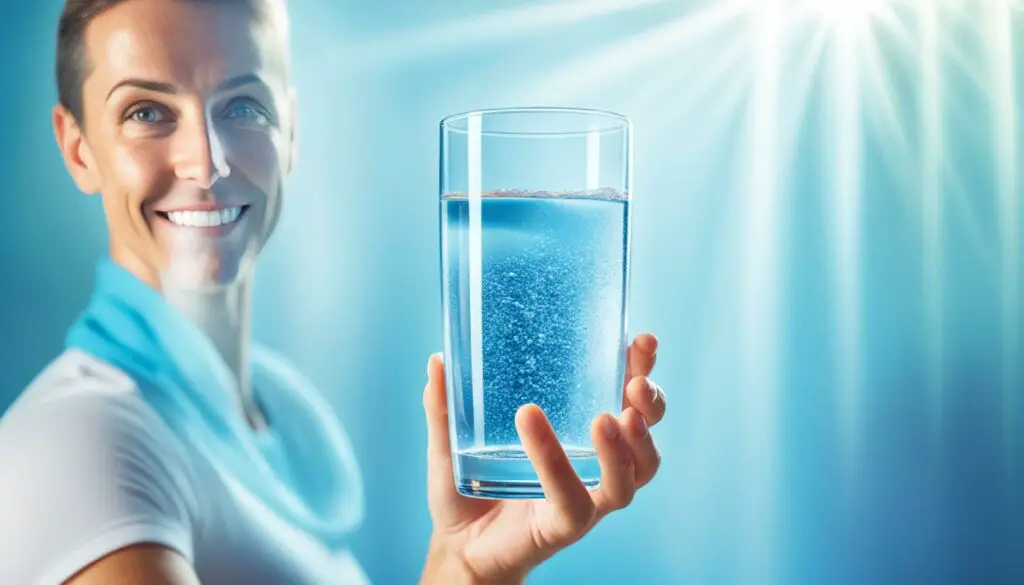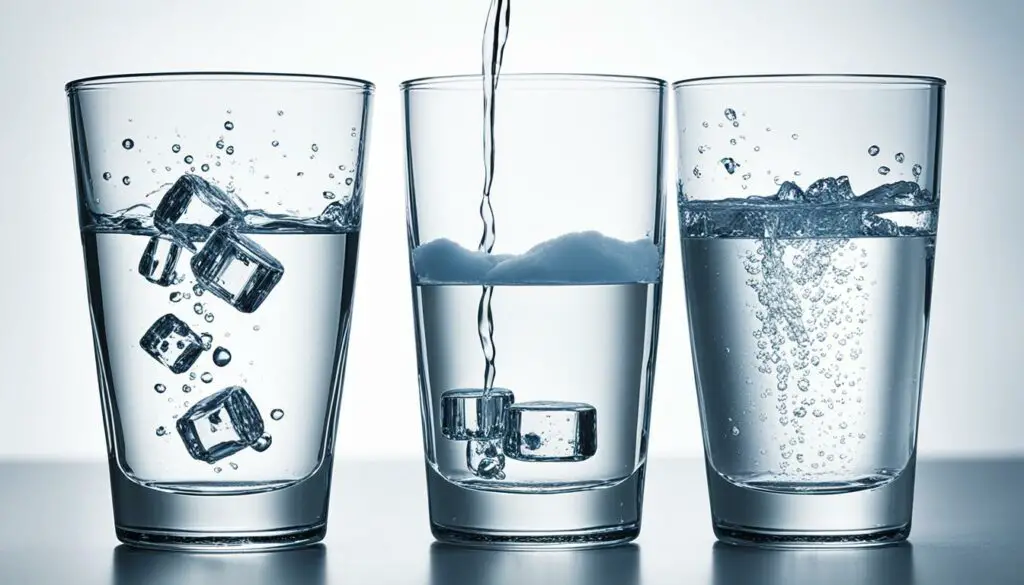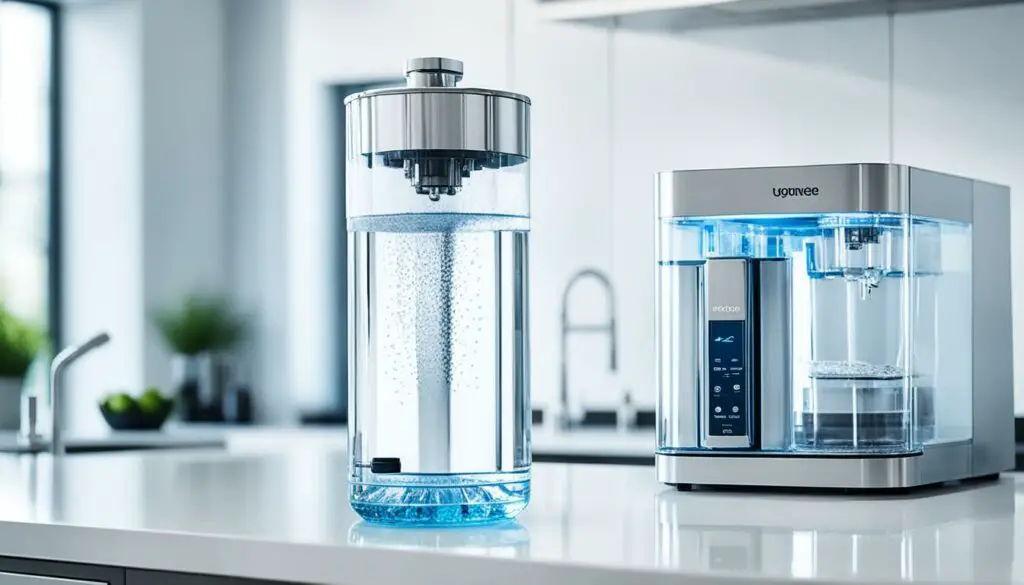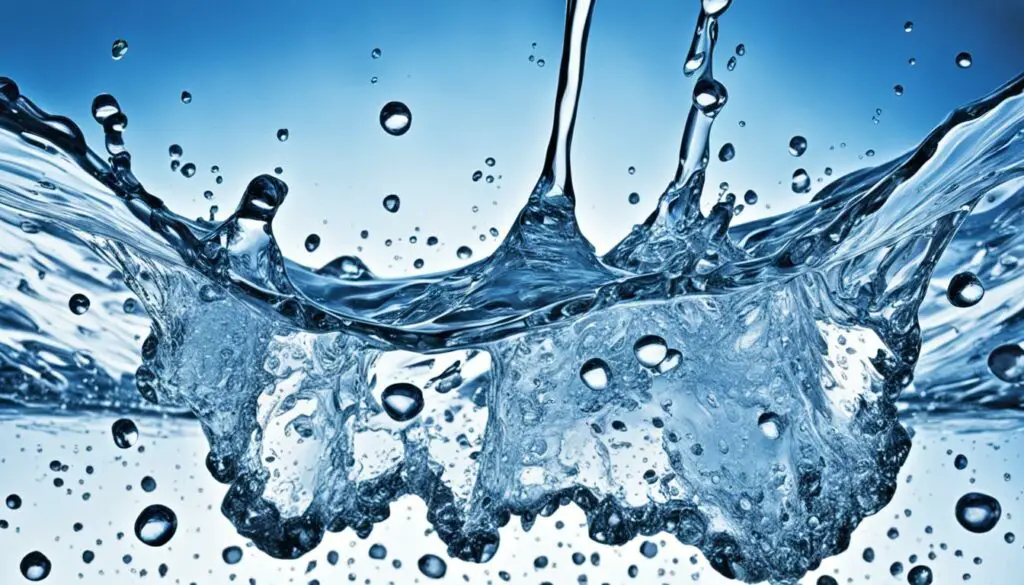When it comes to choosing the right water for drinking, there are many options available. One popular choice is distilled water, known for its purity and clarity. But is grocery store distilled water safe to drink? Let’s find out.
Distilled water undergoes a rigorous purification process that removes impurities and minerals, resulting in a clean and clear liquid. This process involves boiling the water and then condensing the collected steam back into a liquid form. The result is water that is free from harmful chemicals and contaminants often found in tap water.
So, can you drink distilled water from the grocery store? The answer is yes. Store-bought distilled water goes through the same distillation process as any other distilled water. It is safe for consumption and can be a good choice for those who prefer purified water.
However, it’s important to consider a few factors before making your decision. Distilled water lacks the minerals that are naturally present in tap water, which can affect its taste. Some people find distilled water to have a flat and less flavorful taste compared to other types of water. Additionally, while distilled water is safe to drink, it may not provide the same health benefits as water that contains essential minerals.
Table of Contents
Key Takeaways:
- Grocery store distilled water is safe to drink, as it undergoes the same purification process as other distilled water.
- Distilled water lacks minerals and may have a flat taste compared to other types of water.
- Consider your personal preferences and dietary needs when choosing the type of water to drink.
How is Distilled Water Produced?
Distilled water is produced through the process of distillation, which involves boiling water and then condensing the collected steam back into a liquid. This method effectively removes impurities and minerals from the water, resulting in a purified product that is free from contaminants.
The process of distillation consists of several steps:
- The water is heated to its boiling point, typically around 100 degrees Celsius (212 degrees Fahrenheit).
- As the water boils, steam is produced, leaving behind any impurities, such as minerals, chemicals, and microorganisms, in the original container.
- The generated steam is then collected and cooled, causing it to condense back into liquid form.
- During the cooling process, the condensed steam is collected in a separate container, resulting in distilled water.
This distillation process effectively removes impurities from the water, ensuring a purified and clean end product. It is a tried and tested method for producing distilled water, which is widely used for various applications where pure water is necessary.
Image:
Pros and Cons of Drinking Distilled Water

When it comes to drinking distilled water, there are both benefits and drawbacks to consider. Let’s take a closer look at each:
Benefits of Drinking Distilled Water
- Purification: One of the primary benefits of drinking distilled water is that it is purified, meaning it has undergone a process to remove harmful chemicals and contaminants found in tap water.
- Clean and Safe: Distilled water is free from impurities, making it a safe option for consumption. It provides peace of mind knowing that you are drinking water without any potentially harmful substances.
Drawbacks of Drinking Distilled Water
- Lack of Minerals: One of the drawbacks of drinking distilled water is that it lacks the minerals that are naturally present in other types of water, such as tap water. These minerals, like calcium and magnesium, play a vital role in maintaining overall health.
- Taste: Due to the absence of minerals, distilled water may have a flat and less enjoyable taste compared to other types of water.
It’s important to consider both the benefits and drawbacks before making a decision about drinking distilled water on a regular basis.
| Pros | Cons |
|---|---|
| Purified and free from harmful chemicals | Lacks essential minerals |
| Clean and safe to consume | Potentially less enjoyable taste |
Distilled Water vs. Other Types of Water

When comparing distilled water to other types of water, it’s important to understand the differences in their purification processes and mineral content. Distilled water is a type of purified water that undergoes a specific distillation process to remove impurities and minerals, resulting in a highly purified product.
Purified water, on the other hand, refers to any water that has been treated to remove impurities. While it also goes through a purification process, it may still retain some minerals depending on the specific treatment method used.
Distilled water:
- Produced through distillation, which involves boiling water and collecting the steam, then condensing it back into a liquid
- Completely purified, with both impurities and minerals removed
- Has a neutral pH and lacks the minerals found in tap water
Purified water:
- Undergoes various purification methods such as reverse osmosis, carbon filtration, or UV treatment
- May retain some minerals depending on the specific purification process
- Can have different pH levels and mineral content depending on the source and treatment method
Below is a table highlighting the key differences between distilled water and purified water:
| Water Type | Purification Process | Mineral Content | pH Level |
|---|---|---|---|
| Distilled Water | Distillation | None | Neutral |
| Purified Water | Various methods (e.g., reverse osmosis, carbon filtration, UV treatment) | Varies depending on treatment method | Varies depending on treatment method |
As the table and image above demonstrate, distilled water is the most extensively purified type of water, with both contaminants and minerals removed. Purified water, although treated to remove impurities, may still contain some minerals depending on the specific purification process.
It’s important to note that while distilled water lacks minerals like calcium and magnesium, these minerals can be obtained through a well-balanced diet that includes other sources such as fruits, vegetables, and dairy products.
Common Uses of Distilled Water

Distilled water has a wide range of applications beyond drinking. Its purity and lack of impurities make it ideal for various household purposes. Let’s explore some common uses of distilled water:
- Steam Irons: Distilled water is often recommended for use in steam irons to prevent mineral buildup and extend the lifespan of the appliance.
- Aquariums: Using distilled water in fish tanks helps maintain the right balance of minerals and reduces the risk of harmful contaminants.
- Watering Plants: Certain delicate plants, such as orchids, benefit from the use of distilled water as it avoids the accumulation of minerals in the soil.
- Car Cooling Systems: Distilled water is commonly used as a coolant in car radiators, as it minimizes the risk of scale buildup and maintains efficient heat transfer.
- Laboratory Experiments: Distilled water is a staple in laboratories, where its purity ensures accurate and consistent results across experiments.
- Medical Devices: Certain medical devices, like CPAP machines for sleep apnea, often require distilled water to prevent mineral deposits and promote optimal performance.
By utilizing distilled water in these applications, you can benefit from its purity and avoid potential issues related to mineral buildup and contamination.
As you can see, distilled water serves a variety of household needs, from maintaining appliances and plants to supporting scientific endeavors and medical treatments. Incorporating distilled water into your daily routines can help ensure cleaner, purer results.
Health Effects of Drinking Distilled Water

When it comes to the health effects of drinking distilled water, there are differing opinions and viewpoints. Some individuals claim that drinking distilled water can offer various health benefits, including detoxification and improved overall well-being. They argue that the purification process removes impurities and harmful substances, resulting in a cleaner and healthier option. However, it’s important to note that these claims may lack scientific evidence and are often based on personal experiences and anecdotal information.
On the other hand, critics of drinking distilled water argue that it may lead to potential risks and drawbacks. One concern is the potential depletion of essential minerals from the body. Since distilled water undergoes the removal of minerals during the distillation process, some people worry that regular consumption may result in mineral deficiencies over time. However, it’s worth mentioning that minerals can easily be obtained through a well-balanced diet, reducing the potential risks associated with mineral loss.
In reality, the health effects of drinking distilled water are unlikely to be significant. While it may lack the beneficial minerals found in tap water or other sources, it is important to remember that a varied and nutritious diet can provide these minerals adequately. Ultimately, the decision to drink distilled water should be based on individual preferences and needs.
In reality, the health effects of drinking distilled water are unlikely to have a profound impact, as long as one maintains a balanced diet and remains mindful of their mineral intake.
Pros and Cons of Drinking Distilled Water
To better understand the pros and cons of drinking distilled water, let’s explore some of the key factors:
- Benefits of Drinking Distilled Water: The purification process removes impurities, contaminants, and potential harmful chemicals from the water, providing a clean and safe drinking option. Some individuals believe drinking distilled water can support detoxification and a healthier lifestyle.
- Drawbacks of Drinking Distilled Water: Distilled water lacks the naturally occurring minerals found in tap water, which can contribute to taste and potentially impact the mineral balance in the body. Additionally, some people may find the taste of distilled water less enjoyable than other types of water.
| Health Benefits | Potential Risks | |
|---|---|---|
| Drinking Distilled Water |
|
|
Can You Drink Distilled Water from the Grocery Store?

Store-bought distilled water is safe to drink, as it goes through the same distillation process as any other distilled water. However, it’s important to check the source and quality of the water to ensure it meets safety standards.
Distilled water from the grocery store undergoes a rigorous distillation process, which involves boiling the water and then condensing the steam to separate impurities and minerals. This process ensures that the water is purified and free from contaminants.
Many reputable grocery stores carry trusted brands of distilled water, which are regularly tested for quality and safety. It’s important to look for distilled water that is certified by recognized regulatory bodies, such as the Food and Drug Administration (FDA).
When purchasing distilled water from the grocery store, always check the label to verify the source and ensure it meets safety regulations. Look for information about the distillation process and any additional purification methods used. It’s also a good idea to choose brands that have a reputation for quality and reliability.
Overall, drinking distilled water from the grocery store is a safe choice. However, if you have any concerns or specific health conditions, it’s always best to consult with a healthcare professional or a registered dietitian to ensure that distilled water is suitable for your individual needs.
| Brand | Source | Additional Purification Methods | Safety Certifications |
|---|---|---|---|
| Brand A | Spring Water | Carbon Filtration | FDA Approved |
| Brand B | Reverse Osmosis | UV Treatment | FDA, NSF Certified |
| Brand C | Municipal Water | Activated Charcoal Filter | FDA, EPA Registered |
The Taste of Distilled Water

When it comes to the flavor of distilled water, it is important to note that it has a distinct difference compared to tap water and other bottled waters. Distilled water has a flat, less flavorful taste. This is primarily because the distillation process removes the minerals that contribute to the taste and flavor of water. Without these minerals, distilled water lacks the characteristic crispness and refreshing qualities that many people associate with their favorite beverages.
Unlike tap water, which can vary in taste depending on the source and treatment processes, distilled water has a consistent and neutral taste. Some individuals may find this taste less enjoyable, especially if they are accustomed to the flavors of tap water or other types of bottled water. However, others may appreciate the clean and pure taste that distilled water offers.
“The taste of distilled water reminds me of a blank canvas waiting to be filled with flavors. It’s incredibly clean and refreshing.” – Sarah
Keep in mind that the taste of store-bought distilled water is generally the same as other types of distilled water. The distillation process used in the production of store-bought distilled water ensures that it is free from impurities and contaminants, making it safe to consume.
While distilled water may not have the most exciting flavor profile, it serves its purpose as a clean and pure source of hydration. Whether you enjoy the taste of distilled water or prefer the flavors of other beverages, the choice ultimately comes down to personal preference.
How Does the Taste of Distilled Water Compare to Other Types?
When comparing the taste of distilled water to other types of water, it’s important to note the differences. Here’s a brief overview:
- Tap Water: Tap water often has a slightly mineral taste due to the presence of naturally occurring minerals like calcium and magnesium. The taste and quality can vary depending on the source and treatment processes.
- Bottled Spring Water: Spring water generally has a refreshing taste with subtle mineral undertones, thanks to its origin from natural springs.
- Purified Water: Purified water goes through various filtration processes to remove impurities and contaminants. It typically has a neutral taste like distilled water.
- Mineral Water: Mineral water contains naturally occurring minerals, such as magnesium and calcium, which give it a distinct taste and potential health benefits.
- Flavored Water: Flavored water is infused with fruit extracts or artificial flavors, resulting in a wide range of taste profiles to suit different preferences.
Overall, the taste of distilled water is often described as “clean” and “pure,” but it may lack the complexity and flavor notes found in other types of water. If taste is a significant factor for you, exploring different options can help you find the water that best suits your palate.
Distilled Water and Mineral Deficiencies

While distilled water offers a purified alternative to tap or bottled water, it lacks the essential minerals like calcium and magnesium that are naturally present in other water sources. These minerals play a crucial role in maintaining overall health and bodily functions. However, the nutritional impact of drinking distilled water on mineral deficiencies depends on various factors.
If you have a well-balanced diet that includes foods rich in these minerals, such as dairy products, leafy greens, and nuts, the lack of minerals in distilled water is unlikely to cause deficiencies. The body can obtain these essential minerals from dietary sources, ensuring that you receive adequate amounts.
However, if you rely heavily on distilled water for hydration and do not consume foods that are good sources of calcium and magnesium, there is a potential risk of developing mineral deficiencies over time. In such cases, it is important to consider diversifying your water intake and incorporating mineral-rich foods into your diet.
To ensure a balanced intake of essential minerals, you can:
- Incorporate a variety of fruits, vegetables, whole grains, and legumes into your meals
- Consume dairy products or calcium-fortified alternatives for calcium
- Include sources of magnesium such as nuts, seeds, and whole grains
- Consult with a healthcare professional or a registered dietitian to evaluate your dietary needs and provide personalized recommendations
It is worth emphasizing that while mineral deficiencies can occur, they are generally uncommon in individuals with a healthy and diversified diet. However, if you have specific health concerns, it is advisable to seek guidance from a healthcare professional.
| Mineral | Food Sources |
|---|---|
| Calcium | Dairy products (milk, cheese, yogurt), tofu, leafy greens (kale, spinach), fortified plant-based milk, sardines |
| Magnesium | Nuts and seeds (almonds, cashews, pumpkin seeds), leafy greens (spinach, Swiss chard), whole grains (oats, brown rice), legumes (black beans, lentils) |
The Safety of Distilled Water
When it comes to drinking water, safety is a top priority. Fortunately, distilled water is generally considered safe for consumption. The distillation process removes impurities and contaminants, ensuring the purity of the water.
Distilled water undergoes a purification process known as distillation. This process involves boiling water to create steam, then condensing the steam back into a liquid form. During this process, impurities, minerals, and other substances are left behind, resulting in pure, clean water.
The purity of distilled water is one of its key advantages. It does not contain harmful chemicals or contaminants commonly found in tap water, making it a popular choice for those concerned about water quality. However, it’s important to note that while distilled water is safe to drink, it may lack certain minerals that are beneficial for overall health.
Drinking water is essential for maintaining hydration and supporting bodily functions. Some minerals found in tap water, such as calcium and magnesium, contribute to the overall mineral intake. While distilled water is pure and lacks these minerals, you can obtain them from other sources, such as a well-balanced diet.
“Drinking purified water removes beneficial minerals like magnesium and calcium, which can have adverse health effects when mineral intake from other sources is low.”
It’s also worth considering the source and quality of the distilled water you consume. Store-bought distilled water is generally safe, as it undergoes the same purification process as any other distilled water. However, it’s important to choose reputable brands or sources to ensure the water meets safety standards.
“Ensuring the safety of the water you consume is crucial. Always opt for distilled water from trusted brands or sources that comply with safety regulations.”
To summarize, distilled water is generally safe for drinking purposes. Its purification process eliminates impurities, offering a pure and clean water source. However, it’s important to consider the lack of certain minerals and ensure the source and quality of the water to maintain its safety.
Pros and Cons of Drinking Distilled Water
| Pros | Cons |
|---|---|
|
|
The Role of Minerals in Water
When it comes to the composition of water, minerals play a significant role in both taste and overall health benefits. Tap water, unlike distilled water, naturally contains minerals like calcium and magnesium, which contribute to its distinct flavor and provide essential nutrients for our bodies. These minerals are sourced from the rocks and soil that water passes through, absorbing trace amounts of valuable elements along the way.
The mineral content in tap water varies depending on the source and location. For instance, water derived from mountainous areas may have higher mineral content due to the geological composition of the region. Calcium and magnesium, in particular, are important minerals found in tap water that contribute to bone health, muscle function, and electrolyte balance.
While distilled water is stripped of these beneficial minerals during the distillation process, it doesn’t mean we can’t obtain them from other sources. A well-balanced diet that includes foods rich in calcium and magnesium, such as dairy products, leafy greens, and nuts, can help replenish the minerals our bodies need.
The Importance of Minerals in Water:
- Enhanced taste: Minerals like calcium and magnesium add a subtle flavor profile to water, making it more enjoyable to drink.
- Hydration and electrolyte balance: Minerals in tap water contribute to maintaining proper hydration and the balance of electrolytes in our bodies.
- Bone health: Calcium is essential for building and maintaining strong bones and teeth.
- Muscle function: Magnesium plays a crucial role in muscle contraction and relaxation.
- Nutrient absorption: Minerals in water can aid in the absorption of other nutrients in our diet.
In summary, while distilled water lacks the minerals found in tap water, it doesn’t mean we have to rely solely on water to meet our mineral requirements. By consuming a well-rounded diet that includes calcium- and magnesium-rich foods, we can ensure that our bodies receive the essential minerals they need for optimal health.
Conclusion
After examining the safety and considerations of drinking distilled water, it can be concluded that distilled water from the grocery store is safe for consumption without major health risks. The distillation process effectively removes impurities from the water, ensuring its purity.
However, it is important to note that drinking distilled water may lack the taste and beneficial minerals found in tap water. The absence of these minerals can affect the overall flavor and potential health benefits. It is recommended to consider personal preferences and dietary needs when choosing the type of water to drink.
In conclusion, while drinking distilled water from the grocery store is a viable option, individuals who prefer a more flavorful or mineral-rich drinking experience may opt for other types of water. Ultimately, the choice between distilled water and other options depends on individual preference, taste preference, and potential nutritional considerations.
FAQ
Is grocery store distilled water safe to drink?
Yes, grocery store distilled water is safe to drink. It goes through the same distillation process as any other distilled water, removing impurities and contaminants.
How is distilled water produced?
Distilled water is produced by boiling water and then condensing the collected steam back into a liquid. This process removes impurities and minerals from the water, resulting in a purified product.
What are the pros and cons of drinking distilled water?
Drinking distilled water has the benefit of being free from harmful chemicals and contaminants found in tap water. However, it lacks the minerals that contribute to overall health and may have a less enjoyable taste.
How does distilled water compare to other types of water?
Distilled water is a type of purified water that has had both contaminants and minerals removed. Purified water may still contain some minerals, while distilled water is completely purified through the distillation process.
What are the common uses of distilled water?
Distilled water is commonly used in various applications, such as steam irons, aquariums, watering plants, car cooling systems, laboratory experiments, and certain medical devices like CPAP machines.
What are the health effects of drinking distilled water?
There are conflicting opinions about the health effects of drinking distilled water. Some claim it can detoxify the body and improve health, while others argue it may leach minerals from the body. In reality, distilled water is unlikely to have significant health benefits or risks.
Can you drink distilled water from the grocery store?
Yes, you can drink distilled water from the grocery store. It undergoes the same distillation process as any other distilled water. However, it’s important to check the source and quality of the water to ensure it meets safety standards.
What does distilled water taste like?
Distilled water has a flat, less flavorful taste compared to tap water and other bottled waters. This is because it lacks the minerals that contribute to the taste of water. Some people may find the taste of distilled water less enjoyable.
Does drinking distilled water cause mineral deficiencies?
Distilled water does not provide the minerals like calcium and magnesium that are present in tap water. However, if you have a well-balanced diet, the lack of minerals in distilled water is unlikely to cause deficiencies.
Is drinking distilled water safe?
Distilled water is generally safe to drink, as it undergoes a purification process that removes impurities. However, the source and quality of the water should be considered to ensure its safety.
What role do minerals play in water?
Tap water contains minerals like calcium and magnesium that contribute to the taste and overall health benefits. While distilled water lacks these minerals, they can be obtained from a well-balanced diet.
Source Links
- https://www.webmd.com/diet/distilled-water-overview
- https://www.healthline.com/health/can-you-drink-distilled-water
- https://www.springwellwater.com/distilled-water-facts/
See also:
Leave a Reply